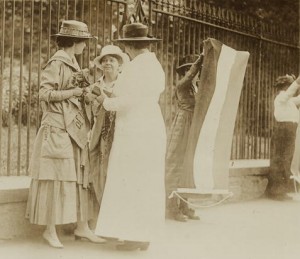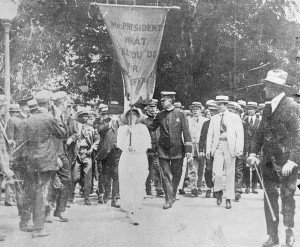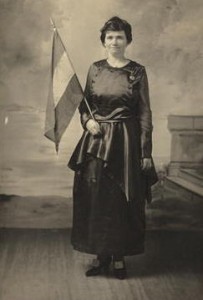Delaware’s silent sentinels, Delaware women in the fight for women’s suffrage
In a previous post, I covered the role of Delaware women in the struggle to ratify the 19th Amendment to the Constitution, granting women the right to vote. Women from Delaware also played an important part in the long and difficult struggle to get the amendment proposed and passed by Congress. The National Woman’s Party, founded in 1916, was a women’s rights group that used more militant tactics to get the attention of politicians and the public.
One of the leaders of the NWP was Delawarean Mabel Vernon. Born in Wilmington in 1883, her father was a newspaper editor. She attended Swarthmore College, where she met Alice Paul, who would become the leader of the NWP. After college Vernon worked as a teacher until Paul asked her to work as an organizer for the Congressional Union for Woman Suffrage and NWP. She organized local protests and nationwide tours and became an accomplished speaker. In 1916 she led a group of activists who unfurled a banner and heckled President Wilson during a speech to Congress.

A policewoman (in white) arrests Delawarean Annie Arniel (center left) for picketing the White House
In 1917, the NWP decided to step up pressure on President Wilson and organized pickets in front of the White House. Calling themselves “silent sentinels” the women picketed the White House, in Lafayette Park and at other government buildings. In June 1917 the police began arresting picketers. Initially they were usually released without charge, but when the protests continued the penalties became more serious. Alice Paul and other women were sentenced to up to 6 months in Occoquan Workhouse. Some prisoners held hunger strikes and were force-fed by prison authorities. Released prisoners were sent on nationwide tours by the NWP and spoke to crowds wearing their prison uniforms.
A number of Delaware women were among the protesters. Seven served jail time: Mabel Vernon, Florence Bayard Hilles, Annie J. Magee, Naomi Barrett, Annie Arniel, Catherine Boyle, and Mary Brown. Annie Arniel of Wilmington, who had worked in a munitions factory, spent the most time in jail. She was arrested 8 times and spent a total of 103 days in jail. After one of her arrests Arniel told the Sunday Star, a Wilmington paper, “We were good enough to work in the steel plant and help load shells for the battle-fields of France, but we are still not good enough to vote, it seems. Can anyone see justice in this?”
The National Woman’s Party continued the protests until 1919 when Congress passed the 19th Amendment.
Photo credits: Photographs from the Records of the National Woman’s Party. Library of Congress and Library of Congress, Prints and Photographs Division.
For more information see:
Annie L. Arniel, the Iron-Jawed Suffragette. Webpage by Ken Menard. http://www.angelfire.com/space/kingstonroots/Menard/AnnieArniel.html
Ford, Linda G. Iron-Jawed Angels: The Suffrage Militancy of the National Woman’s Party, 1912-1920. University Press of America, 1991.
Mabel Vernon: Speaker for Suffrage and Petitioner for Peace. Interview by Amelia R. Fry. Bancroft Library. Suffragists Oral History Project.
Stevens, Doris. Jailed for Freedom. Boni and Liveright, 1920.
The Suffrage Movement in Delaware. Historical Society of Delaware http://www.hsd.org/Women_SuffrageMainPage.htm
Women of Protest: Photographs from the Records of the National Woman’s Party. Library of Congress. http://memory.loc.gov/ammem/collections/suffrage/nwp/index.html

